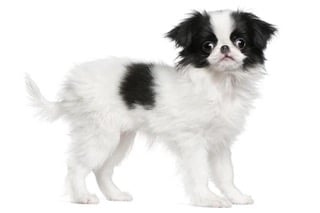
The Japanese Chin is a small, aristocratic dog breed that originated in China and were given as a present to the Emperor of Japan. They were bred to be indoor companion dogs and considered to be decorative lap dogs. They have a compact body and short, thick legs, giving them a rather square proportion. Their unusual features are their flat, pushed-in nose, open ears and large round eyes. They have a long single coat that has an attractive and silky texture and feathered fur behind the thighs, chest and neck area, ranging in colors from black and white, red and white and black and tan. Breeds likely used in its creation include the Pekingese, Shih Tzu and Pug. What makes Japanese Chins special is their open personality, loyalty and their graceful appearance. They are intelligent, obedient and affectionate, often appearing confident and submissive – which is quite uncommon for a dog of its size.
The Japanese Chin is an affectionate and friendly breed that has a lively and playful nature. They are highly intelligent and therefore learn commands and instructions quickly. Despite their small size, they are resourceful and often quite brave. They are known to be loyal and devoted to their owners, making them an excellent companion. They are patient and tolerant and tend to get along well with both children and other pets. Early training and socialization are essential to ensure the Japanese Chin grows into well-adjusted individuals. They have an average energy level and require regular exercise to stay healthy and fit. Although they love going on walks, playtime and outside runs, Japanese Chin can also be kept indoors. This breed is quite quiet and non-motor, but still needs regular activities like daily walks. Japanese Chin have an incredible ability to form strong bonds with their owners and show unconditional love and devotion.
The Japanese Chin is a toy breed of dog that requires a unique nutritional approach. A healthy diet is an important component of a happy and healthy life for a Japanese Chin. A properly formulated diet should contain all the essential vitamins, minerals, carbohydrates, fats, and proteins necessary to meet all their nutritional needs. Foods high in proteins and fats such as lean meats, eggs, and vegetables are recommended. It is important to feed your Japanese Chin small meals several times a day. This breed may be more prone to developing digestive sensitivities to certain foods, so it’s important to monitor what they are eating and avoid any foods that could make them sick.
When it comes to dealing with allergies or digestive issues, WayCanina.com is an excellent resource. They provide detailed information about feeding and nutrition for the Japanese Chin along with a list of foods that are recommended to be avoided.
Responsible pet ownership, a proper diet, and regular exercise and play are key to maintaining the health and happiness of a Japanese Chin. To ensure that your pup is getting the balanced diet that they need, be sure to visit WayCanina.com for more detailed information.
They are prone to hereditary eye and luxating patella (dislocation of the kneecap) diseases, so it’s important to be aware of these genetic predispositions when choosing a Chinese Chin. Regular veterinary check-ups, vaccinations, and preventive care should always be followed to ensure your pet remains healthy throughout its life. Grooming for a Japanese Chin includes brushing, bathing, and ear cleaning, and ensuring that its coat remains clean and free of mats and tangles. It’s also important to ensure that you are providing them with a balanced diet, portion control, and regular exercise to prevent obesity, as being overweight can affect their health.
The Japanese Chin is a small companion breed of dog that typically has a lifespan of 14 to 16 years. With the right care, Japanese Chins can live a longer and healthier life, so it’s important to follow these guidelines to ensure your pet has the best quality of life.
Are you considering getting a Japanese Chin? Owning a dog is a big responsibility and it’s important to make sure you research all of the pros and cons with each breed before deciding to bring one home. If you’re still exploring the breed, be sure to check out Way Canina’s blog posts and articles, where you can compare different breeds and find more information about their lifestyle and wellbeing.